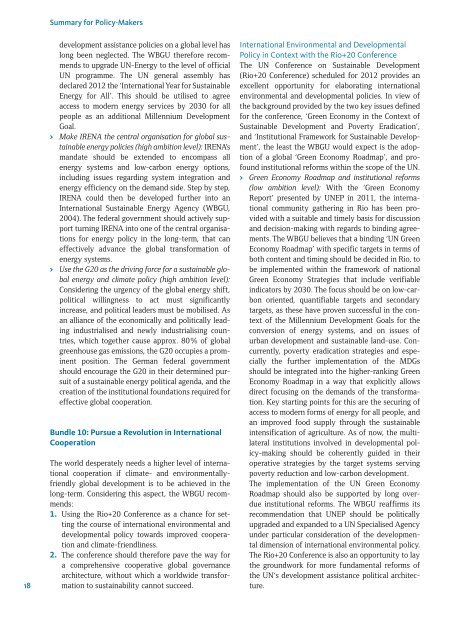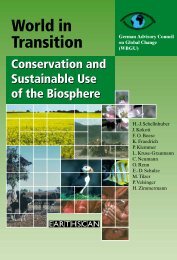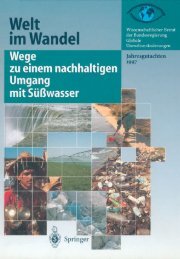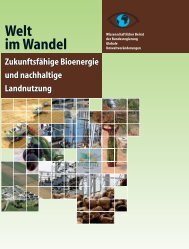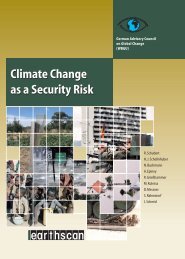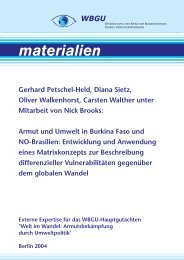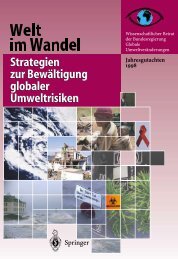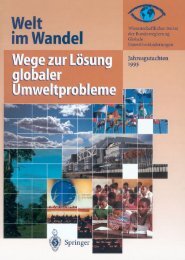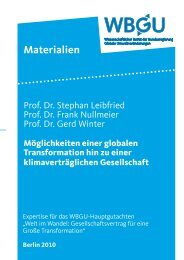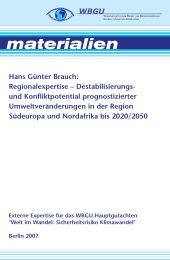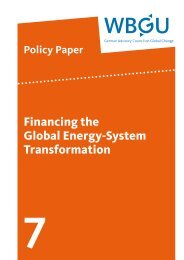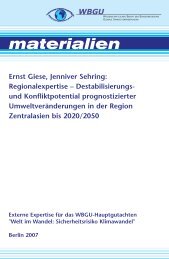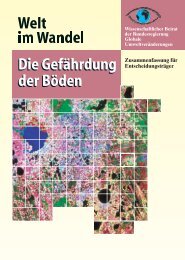World in Transition: A Social Contract for Sustainability - WBGU
World in Transition: A Social Contract for Sustainability - WBGU
World in Transition: A Social Contract for Sustainability - WBGU
You also want an ePaper? Increase the reach of your titles
YUMPU automatically turns print PDFs into web optimized ePapers that Google loves.
18<br />
Summary <strong>for</strong> Policy-Makers<br />
development assistance policies on a global level has<br />
long been neglected. The <strong>WBGU</strong> there<strong>for</strong>e recommends<br />
to upgrade UN-Energy to the level of official<br />
UN programme. The UN general assembly has<br />
declared 2012 the ‘International Year <strong>for</strong> Susta<strong>in</strong>able<br />
Energy <strong>for</strong> All’. This should be utilised to agree<br />
access to modern energy services by 2030 <strong>for</strong> all<br />
people as an additional Millennium Development<br />
Goal.<br />
> Make IRENA the central organisation <strong>for</strong> global susta<strong>in</strong>able<br />
energy policies (high ambition level): IRENA’s<br />
mandate should be extended to encompass all<br />
energy systems and low-carbon energy options,<br />
<strong>in</strong>clud<strong>in</strong>g issues regard<strong>in</strong>g system <strong>in</strong>tegration and<br />
energy efficiency on the demand side. Step by step,<br />
IRENA could then be developed further <strong>in</strong>to an<br />
International Susta<strong>in</strong>able Energy Agency (<strong>WBGU</strong>,<br />
2004). The federal government should actively support<br />
turn<strong>in</strong>g IRENA <strong>in</strong>to one of the central organisations<br />
<strong>for</strong> energy policy <strong>in</strong> the long-term, that can<br />
effectively advance the global trans<strong>for</strong>mation of<br />
energy systems.<br />
> Use the G20 as the driv<strong>in</strong>g <strong>for</strong>ce <strong>for</strong> a susta<strong>in</strong>able global<br />
energy and climate policy (high ambition level):<br />
Consider<strong>in</strong>g the urgency of the global energy shift,<br />
political will<strong>in</strong>gness to act must significantly<br />
<strong>in</strong>crease, and political leaders must be mobilised. As<br />
an alliance of the economically and politically lead<strong>in</strong>g<br />
<strong>in</strong>dustrialised and newly <strong>in</strong>dustrialis<strong>in</strong>g countries,<br />
which together cause approx. 80 % of global<br />
greenhouse gas emissions, the G20 occupies a prom<strong>in</strong>ent<br />
position. The German federal government<br />
should encourage the G20 <strong>in</strong> their determ<strong>in</strong>ed pursuit<br />
of a susta<strong>in</strong>able energy political agenda, and the<br />
creation of the <strong>in</strong>stitutional foundations required <strong>for</strong><br />
effective global cooperation.<br />
Bundle 10: Pursue a Revolution <strong>in</strong> International<br />
Cooperation<br />
The world desperately needs a higher level of <strong>in</strong>ternational<br />
cooperation if climate- and environmentallyfriendly<br />
global development is to be achieved <strong>in</strong> the<br />
long-term. Consider<strong>in</strong>g this aspect, the <strong>WBGU</strong> recommends:<br />
1. Us<strong>in</strong>g the Rio+20 Conference as a chance <strong>for</strong> sett<strong>in</strong>g<br />
the course of <strong>in</strong>ternational environmental and<br />
developmental policy towards improved cooperation<br />
and climate-friendl<strong>in</strong>ess.<br />
2. The conference should there<strong>for</strong>e pave the way <strong>for</strong><br />
a comprehensive cooperative global governance<br />
architecture, without which a worldwide trans<strong>for</strong>mation<br />
to susta<strong>in</strong>ability cannot succeed.<br />
International Environmental and Developmental<br />
Policy <strong>in</strong> Context with the Rio+20 Conference<br />
The UN Conference on Susta<strong>in</strong>able Development<br />
(Rio+20 Conference) scheduled <strong>for</strong> 2012 provides an<br />
excellent opportunity <strong>for</strong> elaborat<strong>in</strong>g <strong>in</strong>ternational<br />
environmental and developmental policies. In view of<br />
the background provided by the two key issues def<strong>in</strong>ed<br />
<strong>for</strong> the conference, ‘Green Economy <strong>in</strong> the Context of<br />
Susta<strong>in</strong>able Development and Poverty Eradication’,<br />
and ‘Institutional Framework <strong>for</strong> Susta<strong>in</strong>able Development’,<br />
the least the <strong>WBGU</strong> would expect is the adoption<br />
of a global ‘Green Economy Roadmap’, and profound<br />
<strong>in</strong>stitutional re<strong>for</strong>ms with<strong>in</strong> the scope of the UN.<br />
> Green Economy Roadmap and <strong>in</strong>stitutional re<strong>for</strong>ms<br />
(low ambition level): With the ‘Green Economy<br />
Report’ presented by UNEP <strong>in</strong> 2011, the <strong>in</strong>ternational<br />
community gather<strong>in</strong>g <strong>in</strong> Rio has been provided<br />
with a suitable and timely basis <strong>for</strong> discussion<br />
and decision-mak<strong>in</strong>g with regards to b<strong>in</strong>d<strong>in</strong>g agreements.<br />
The <strong>WBGU</strong> believes that a b<strong>in</strong>d<strong>in</strong>g ‘UN Green<br />
Economy Roadmap’ with specific targets <strong>in</strong> terms of<br />
both content and tim<strong>in</strong>g should be decided <strong>in</strong> Rio, to<br />
be implemented with<strong>in</strong> the framework of national<br />
Green Economy Strategies that <strong>in</strong>clude verifiable<br />
<strong>in</strong>dicators by 2030. The focus should be on low-carbon<br />
oriented, quantifiable targets and secondary<br />
targets, as these have proven successful <strong>in</strong> the context<br />
of the Millennium Development Goals <strong>for</strong> the<br />
conversion of energy systems, and on issues of<br />
urban development and susta<strong>in</strong>able land-use. Concurrently,<br />
poverty eradication strategies and especially<br />
the further implementation of the MDGs<br />
should be <strong>in</strong>tegrated <strong>in</strong>to the higher-rank<strong>in</strong>g Green<br />
Economy Roadmap <strong>in</strong> a way that explicitly allows<br />
direct focus<strong>in</strong>g on the demands of the trans<strong>for</strong>mation.<br />
Key start<strong>in</strong>g po<strong>in</strong>ts <strong>for</strong> this are the secur<strong>in</strong>g of<br />
access to modern <strong>for</strong>ms of energy <strong>for</strong> all people, and<br />
an improved food supply through the susta<strong>in</strong>able<br />
<strong>in</strong>tensification of agriculture. As of now, the multilateral<br />
<strong>in</strong>stitutions <strong>in</strong>volved <strong>in</strong> developmental policy-mak<strong>in</strong>g<br />
should be coherently guided <strong>in</strong> their<br />
operative strategies by the target systems serv<strong>in</strong>g<br />
poverty reduction and low-carbon development.<br />
The implementation of the UN Green Economy<br />
Roadmap should also be supported by long overdue<br />
<strong>in</strong>stitutional re<strong>for</strong>ms. The <strong>WBGU</strong> reaffirms its<br />
recommendation that UNEP should be politically<br />
upgraded and expanded to a UN Specialised Agency<br />
under particular consideration of the developmental<br />
dimension of <strong>in</strong>ternational environmental policy.<br />
The Rio+20 Conference is also an opportunity to lay<br />
the groundwork <strong>for</strong> more fundamental re<strong>for</strong>ms of<br />
the UN‘s development assistance political architecture.


